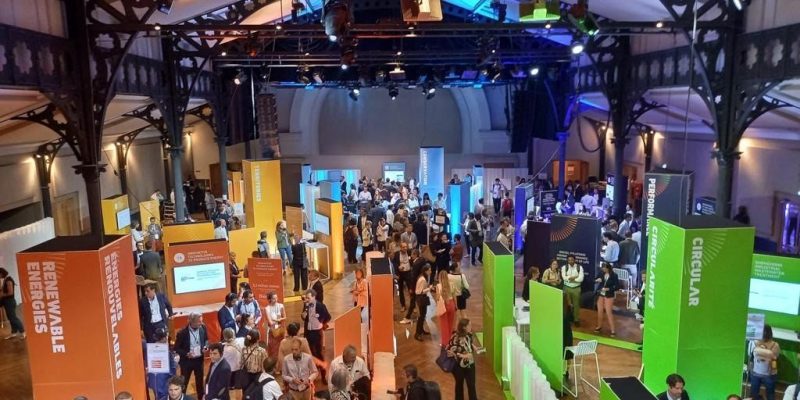The Suez group recently held its Innovation Day in Paris, France. The aim was to present its innovations and solutions for water and waste management, as well as for reducing carbon dioxide (CO2) emissions, one of the greenhouse gases responsible for global warming. To date, the group is working with 1,100 experts of 30 nationalities, with at least 1,700 patents registered.
“Suez wants to make innovation the driving force behind its development”. These were the words of Sabrina Soussan at the opening of the Suez Innovation Day in Paris on Tuesday 20 June 2023. The aim of the event was to present innovations and solutions to the challenges of waste and water management around the world. According to the Suez group’s Chairman and CEO, the provision of essential services “must evolve to better meet today’s challenges, in particular climate change”.
In Africa, climate change is reflected in water stress, which is particularly affecting the Maghreb, southern Africa and the Horn of Africa. Faced with this phenomenon, which is likely to intensify over the next few years, Suez is proposing to clean up the available resources and replenish the water tables. In the case of the Paris region in France, for example, the technique involves pumping water from the Seine, which flows through the capital Paris, and reinjecting it into the water table after pre-treatment to eliminate pollutants.
Recharge maintains the balance between the river and the water tables around the Paris basin. This solution is particularly interesting in a context marked by climate change, which is also reflected in rising sea levels and saline intrusion into farmland and groundwater. In a coastal region where water resources are a key issue at the crossroads of multiple uses (drinking, industrial and agricultural), the intrusion of salt water into freshwater can prove disastrous.
As well as building treatment infrastructure, Suez is focusing on distribution and collection networks. The challenges and costs of network infrastructure are often underestimated. Suez has developed robot and drone inspection technologies, as well as remote sensing for drinking water and wastewater networks”, explains Jérôme Bailly, the Group’s Innovation Director.
The challenge of recycling wind turbine blades
At the Suez Innovation Day, Sabrina Soussan once again reiterated her group’s ambition “to increase the budget allocated to research and development by 50% between now and 2027″. These activities will be implemented through 10 R&D and Excellence centres around the world”. For the moment, the research carried out by the group, which has a turnover of 8.8 billion euros, has led to solutions for reusing treated wastewater in the face of water stress, notably at the Gabal plant operated by the Suez group.
In addition, “Suez converts sewage sludge into energy to power the Alexandria East wastewater treatment plant in Egypt”, explained Jérôme Bailly. The Group’s research also extends to recycling wind turbine blades. This is a necessity in view of the development of vast wind farms around the world, particularly in Africa.
Read also- TUNISIA: Suez to manage liquid wastewater treatment in four governorates for 10 years
Wind turbine blades are made of steel, concrete, aluminium and copper. According to Jérôme Bailly, Suez’s new technology makes it possible to recover 99% of the value of a wind turbine, including the blade. To achieve this, the group has developed a sound wave system that identifies each material contained in the blades and enables it to be better targeted when the blade is cut. This phase is followed by crushing and sorting of the various elements in a densimetric bath that separates the materials, resin and glass fibre.
Potential in Africa
Suez implements this process at the Narval site in Normandy, northern France. The solution was developed as part of the Zero WastE Blade Reach (ZEBRA) project, led by the IRT Jules Verne technology research centre. This innovation also enables the recycling of batteries used to store electricity for photovoltaic solar power plants and electric cars. The solution is being developed at a time when some African countries are relying more on wind power to diversify their electricity mix. This is the case in Egypt, where wind farms are being built at breakneck speed in the Gulf of Suez. South Africa is also relying on wind power for its energy transition. The wind farms built in recent years are due to be decommissioned in around twenty years’ time.
At the same time, the group is stepping up its research into waste management. “Over the last twelve months, and for the first time in Suez’s history, we have started as many waste projects as water projects”, explains Jérôme Bailly. And one of the key issues is sorting, from households to dedicated centres.
What about financial engineering?
After sorting, non-recyclable waste is burnt to produce energy. But burning waste produces carbon dioxide (CO2). “Suez is working on capturing and converting this greenhouse gas (GHG) into a chemical product,” says the Group’s Director of Innovation, based in Paris. The first capture facility is due to be built between 2027 and 2030 at Haverton Hill in the UK. The captured CO2 can be used in the manufacture of various products, including sustainable aviation fuel, which is currently the focus of intense research into decarbonising air transport.
As well as technological research into infrastructure development, there is also a need for accompanying financial engineering. In this context, the Group is involved in setting up public-private partnerships (PPPs), most recently in Tunisia, where it won the concession to manage liquid wastewater treatment in four governorates in the south of the country, in partnership with Segor, the SCET group (Services Conseil Expertises et Territoires) and the Banque Internationale Arabe de Tunisie (BIAT).
Jean Marie Takouleu






